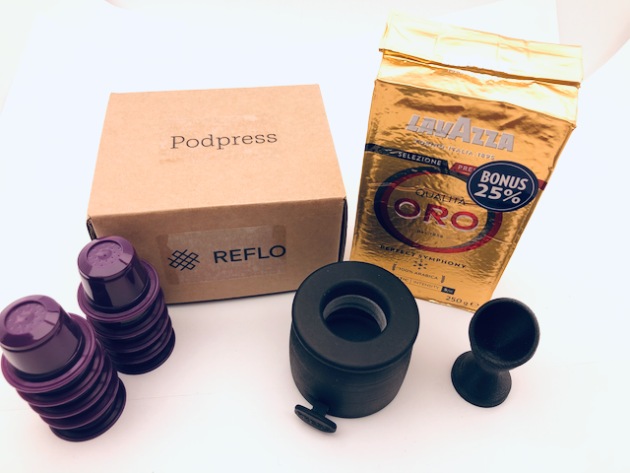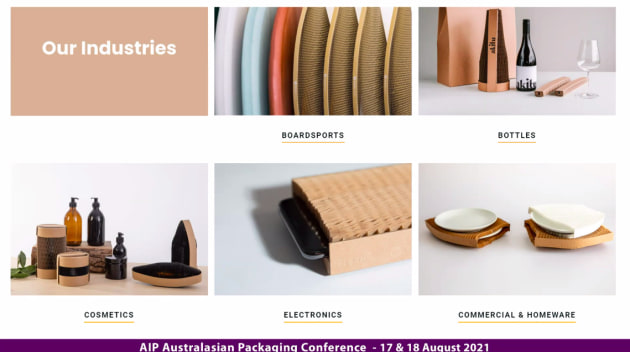Moving away from the norms and changing materials to become more circular and more sustainable has been what has driven Reflo, Cyclpac, MaCher and Coles to make bold steps in their packaging designs.
During Day 2 of the Australian Institute of Packaging (AIP) Australasian Packaging virtual mini conference, speakers from the four organisations explained to those in attendance exactly what it means to “rethink packaging design”.
CONVENIENCE & QUALITY FOR CAPSULES
Reflo, recognised for its Podpress in both the Beverage and Sustainable Reuse Packaging categories at the Australasian Packaging Innovation & Design Awards (PIDAs), is all about simplifying the flow of processes, and it aims to continue that with its Podpress product.
When it comes to coffee, Reflo believes customers deserve the freedom to choose where their coffee comes from, and how it is delivered.
With Podpress, Reflo says you can easily reuse Nespresso-compatible capsules to overcome the inconvenience of capsule systems. It also gives you the freedom to choose the capsule contents, and can be refilled with any number of capsules and coffee types.
The reusable capsules are moulded in food-safe polypropylene. A multi-capsule filling table enables rapid filling and tamping down of coffee in the capsules, and Podpress can seal nine capsules in a matter of minutes.
Gary White, director of Reflo, says Podpress delivers big cost savings in capsules, while also being environmentally responsible because it prevents capsules entering the waste stream.
“It actually breaks down that line through to landfill for coffee capsules as it allows customers to be able to reuse the product over and over again, preventing it from entering landfill,” White said.
“This is great for those with a DIY spirit, and like to play and experiment with coffees. With Podpress, you can do all of that quality and experimentation out of a capsule machine.”

PACKAGING THAT'S FIT FOR PURPOSE
Cyclepac designed Melbourne Coffee from the ground-up, for which it was recognised for at the PIDAs, and went with a ‘four seasons in one day theme’ to capture the feel of the City of Melbourne.
In terms of its material, Cyclepac had set itself some objectives to achieve – 90 per cent single polymer composition was the standard that it was aiming for, which fits the European standard, and sits slightly higher than standards in Australia.
According to the company, its commercially viable solution provides barrier to vapour and gas, is heat resistant, is easily printable, and is up to 70 per cent easier to recycle.
With this alternative to conventional mixed laminate structure, there is also no increase in packaging weight, with potential to reduce in line with packaging format changes, and delivers no compromise to running speeds once set up.
“The primary objective of packaging is to protect the product within it, preserve it, extend shelf life wherever possible, and communicate to consumers,” said Edward Whitehead, co-founder and managing director of Cyclepac.
“Reducing food waste is a massive consideration when we talk about packaging, and it plays a critical role in sustainability goals if we can limit and reduce food waste.
“And as we transition to new materials for new markets and new applications in the circular economy, we really need to think about the commercial implications and keep things realistic.”

ALTERNATIVE FOR PLASTIC PROTECTION
MaCher is a design-led business with extensive manufacturing knowledge, with many staff in the business coming from product manufacturing backgrounds.
The company focuses on two specific segments – premium secondary packaging, and its core business, textile material design.
With a goal to remove unnecessary plastic from the packaging industry, MaCher aimed to create a sustainable packaging product offering to brand owners, one that can act as an alternative solution to plastic protective packaging, expanded polystyrene and protective foams.
Enter Flexi-Hex, a paper-based product made from recycled and FSC certified materials. It implements a hexagonal cellular structure to create elasticity and strength, allowing it to suit a range of products.
When used, Flexi-Hex sleeves expand up to 35 times their compact size, and the unique structure of the honeycomb sleeves makes them highly impact resistant.
“There has always been innovation, new materials and lots of ideas kicking around, but it has always been quite hard to get traction quickly. With the 2025 targets, I think it has really created an amazing amount of momentum and engagement from brand owners and retailers,” said Simon Back, general manager of MaCher.
“With the Flexi-Hex, it is simple to use and integrate with supply chains, and it really is a genuine alternative to products already out there – it is durable, sustainable, unique and beautiful.”

AMBITIONS FOR SUPERMARKET SUSTAINABILITY
Coles launched its Together to Zero Sustainability Strategy in a bid to become the country’s most sustainable supermarket, and has included sustainable packaging and development as one of its key pillars.
The campaign, which kicked off on 25 July, highlights Coles’ aspiration towards zero waste, zero emissions and zero hunger, and encourages all Australians to work together to ensure Australia is a better place for future generations.
Part of Coles’ journey to become more sustainable is to look for opportunities to reduce unnecessary plastic, including in its packaging.
As part of its pledge to make packaging more sustainable, Coles has removed 31 million soaker pads from meat trays this year, which means 31 million soaker pads not being sent to landfill.
Coles says it will close the loop on the packaging of some of its most popular instore bakery items by committing to have them made with 100 per cent recycled content in FY22, in addition to already being fully recyclable at kerbside.
The change will apply to 60 million pieces of packaging each year on instore bakery products like cookies, donuts, danishes and muffins. Instead, the packaging will be made from 100 per cent recycled PET.
"As one of the largest retailers, we really do have a significant impact and an opportunity to contribute to the delivery of the UN Sustainable Development Goals, and we must all play our role in driving these sustainable ambitions," said Caitlyn Richards, responsible sourcing manager, Coles Group.
"Sustainability and responsible sourcing has been a big focus for Coles for many years, and as part of our program, we engage credible and third-party experts including industry groups, consultants and NGOs to really help deliver our programs, and sustainable packaging is an incredibly complicated topic to tackle.
"We always know that our customers want us to reduce packaging and to make it easier for them to recycle, so we're constantly exploring new ways to protect the environment and investigate important environmental projects and partnerships to reduce that impact."

The 2021 AIP Australasian Packaging mini conference was held on 17-18 August and showcased best-practice and award-winning packaging designs that have been recognised at the Australasian Packaging Innovation & Design Awards (PIDAs).
The Women in Packaging Forum, run by PKN Packaging News and Food & Drink Business, in partnership with the AIP, was also held on 18 August. Click here for coverage on the keynote and the panel conversation.





